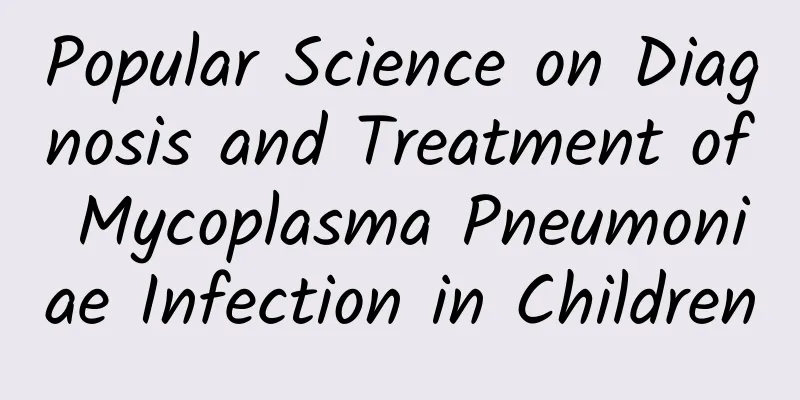Popular Science on Diagnosis and Treatment of Mycoplasma Pneumoniae Infection in Children

|
As parents, we all hope that our children can grow up healthy and happy. However, diseases always attack our children mercilessly. Mycoplasma pneumoniae infection is one of the common lung infections in children, which poses a serious threat to children's health. In order to help parents better understand and deal with Mycoplasma pneumoniae infection in children, this article provides a detailed introduction, aiming to improve everyone's understanding of Mycoplasma pneumoniae infection in children and do a good job in prevention, diagnosis and treatment. 1. Understanding Mycoplasma pneumoniae Mycoplasma pneumoniae is a common pathogen of pneumonia infection, which can be transmitted through droplets and cause respiratory infections. This pathogen is particularly common in children and is usually spread within families. The incubation period of pneumonia infection is long, up to 2-3 weeks. 2. Symptoms of Mycoplasma pneumoniae infection Mycoplasma pneumoniae infection in children is a common respiratory disease, with symptoms including general discomfort, loss of appetite, headache, chills and fatigue. In addition, fever is also a common symptom of Mycoplasma pneumoniae infection, usually between 38.5℃-39℃, with a long duration and easy recurrence. Cough is also a typical symptom of Mycoplasma pneumoniae infection, which starts as a dry cough and then turns into a violent cough with no sputum or only a small amount of sticky sputum. In addition to the above symptoms, some children may also experience joint pain, myalgia, difficulty walking, and other symptoms. If mycoplasma invades the urinary system, it may also cause symptoms such as frequent urination, urgency, and pain when urinating. If accompanied by myocarditis, there may be chest tightness, heart palpitations, palpitations, shortness of breath, fever, and even frequent shortness of breath and sighing. If accompanied by hepatitis, there may be symptoms such as poor appetite, vomiting, and abdominal discomfort. If accompanied by meningitis, there may be symptoms such as changes in consciousness, vomiting, headaches, and convulsions. 3. Diagnosis of Mycoplasma pneumoniae infection Doctors can diagnose M. pneumoniae infection in several ways: Blood tests: Elevated levels of antibodies to M. pneumoniae in the blood can help diagnose infection. However, because antibody levels may remain elevated for weeks after infection, your doctor may need to refer to other test results to make a diagnosis. Sputum culture: Sputum culture is another way to diagnose M. pneumoniae infection. However, since culture takes time and M. pneumoniae may not be cultured in every case, it may take some time for this method to get results. X-rays: X-rays can show whether there is inflammation or other abnormalities in the lungs, but they are usually combined with other test results to confirm the diagnosis of M. pneumoniae infection. Treatment of Mycoplasma pneumoniae infection Mycoplasma pneumoniae infections are usually treated with antibiotics, such as azithromycin or erythromycin. These drugs are effective in killing the Mycoplasma pneumoniae, relieving symptoms, and preventing complications. However, antibiotics do not shorten the duration of the illness, so it may take a while for your child to fully recover. Doctors will take appropriate symptomatic treatment measures for the symptoms of Mycoplasma pneumoniae infection. For example, if the child has a fever, the doctor may give antipyretic drugs; if the child has a cough, the doctor may give cough suppressants, etc. In addition, for severe Mycoplasma pneumoniae infection, other treatments may be needed, such as oxygen therapy, infusion, etc. During the treatment period, parents should pay attention to letting their children get enough rest, keep the indoor air circulating, and avoid contact with other children to prevent infection. At the same time, a reasonable diet is also very important. Parents should provide their children with nutritious and easy-to-digest food, such as lean meat, eggs, fish, etc. In order to prevent Mycoplasma pneumoniae infection and other respiratory diseases, parents should vaccinate their children with appropriate vaccines as recommended by their doctors. Conclusion In short, mycoplasma pneumoniae infection in children is a common disease, and parents should pay attention to their children's symptoms and diagnose and treat them early. While using antibiotics for treatment, parents should also pay attention to their children's care and nutritional supplements to promote their recovery. Li Fangtao, Ningjin County Maternal and Child Health Hospital |
<<: Tips for older women to prepare for pregnancy
>>: Guidelines for the prevention of common surgical complications
Recommend
At what age do girls start to develop?
At what age do girls start to develop is a hot to...
How to lose weight correctly during breastfeeding
Reasonable weight loss after giving birth is a to...
This bloody history has saved countless lives.
With the introduction of the concept of precision...
How many days is the caesarean section leave?
In order to protect women and respect their ferti...
How many kinds of poisons are hidden in the uterus? How to remove them?
Due to different lifestyles and some living habit...
What is the nutritional value of red pitaya? How to identify red pitaya
Dragon fruit can help reduce internal heat, reple...
To change your acidic constitution, try these methods
We know that under normal physiological condition...
Can I use tampons if I have vaginitis?
Tampons have sparked a revolution in women's ...
Why does backache occur before menstruation?
Menstruation is now a sign of maturity for women....
What should I do if my period is delayed by 14 days?
Menstruation is also called period in books. The ...
What causes small bumps on the vulva?
As women in the new era, they can be independent ...
How many days can the ovarian follicle survive?
The egg cell is a somatic cell discharged from th...
Can advanced cervical cancer be cured?
Cervical cancer is divided into several different...
Is it normal for girls not to have dysmenorrhea?
After female friends reach adulthood, the physiol...
What are egg cells produced from?
In the process of our daily life, we often hear p...









